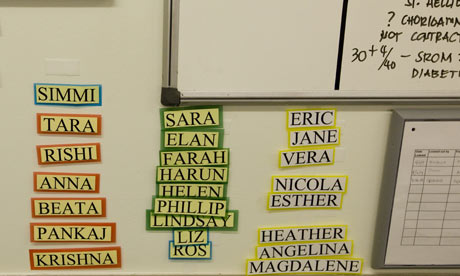
According to Bad Baby Names, a serious work of genealogical research dedicated to the important task of laughing at terrible parents, the United States census in the 19th and early 20th centuries recorded the existence of children named Post Office, Infinity Hubbard, Garage Empty, Emma Royd and Nice Carr. Psychologists, reasonably enough, used to think that being saddled with such a name cursed you for life; they scoured schools and mental health clinics, and concluded that children with funny names achieved lower grades and suffered more emotional disturbance.
But more recent and rigorous studies have confirmed what you might have guessed all along: parents who choose weird names tend to be weird parents in many other ways – and it's this, rather than society's response to a particular name, that's to blame for their children's problems. Either that, or they're simply poor and marginalised, hoping to use a name to provide a distinctiveness they can't bestow using money. When these children don't do well, the cause is poverty, not choice of name. Some scholars even suggest that an unusual name is as likely to help as to hinder, by helping to build a thick skin.
The real ways in which our names exert an influence turn out to be far stranger. It's true that other people do respond badly to certain names – in one well-known study, schoolteachers gave better marks to papers purportedly written by pupils called Karen or David than those called Hubert or Bertha – but the more important factor seems to be internal: without being aware of it, we respond to our own names in ways that can change the course of our lives.
Evidence is piling up for a cognitive bias known as the "name-letter effect", which explains why people called Colin or Cathy are more likely to move to Carlisle, or vote for politicians named Cameron; in the aftermath of Hurricane Katrina, people with a K in their initials were disproportionately represented among charitable donors. And it goes beyond initials: there's a statistically significant surfeit of Phils in Philadelphia and Georges in Georgia – an effect that applies even when you compare only the names of those born elsewhere, in order to eliminate the phenomenon of parents consciously or subconsciously naming a child after his or her birthplace. People called Dennis are – I'm serious – over-represented among dentists, while the same goes for lawyers named Larry or Lauren. What's at work here, researchers speculate, is "implicit egotism", the idea that our preferences and outlook are shaped, much more subtly than we realise, by our attraction to things and people that are in some way like ourselves.
Meanwhile, I note with bafflement that Oliver, according to the most recent figures, is the second most popular name for a baby boy in Britain (or third, if you count all spellings of Mohammed as a single name; predictably, Jack still occupies first place). Which leads to another way in which one's name impacts on one's life: in two years' time, I will be essentially unable to use supermarkets, due to the number of parents shouting, "Oliver! Get here now!" causing me to wheel round in panic before I realise they're talking to their toddlers. Frankly, I wish my parents had thought of this and had the foresight to call me Infinity Hubbard or Garage Empty instead.
oliver.burkeman@theguardian.com

